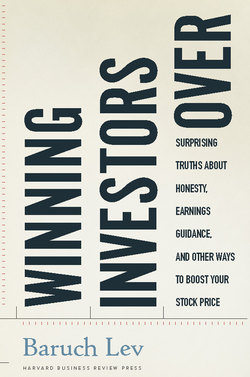Читать книгу Winning Investors Over - Baruch Lev - Страница 6
На сайте Литреса книга снята с продажи.
A U.S.–Centric or a Global Book?
ОглавлениеIs a book like this dealing with capital market strategies restricted to U.S. and U.K. and perhaps Japanese audiences? Absolutely not. Practically every major topic in this book—be it earnings management, mispriced shares, voluntary information disclosure, investors’ alleged short-termism, hedge fund activism, effective corporate governance, managers’ compensation, corporate social responsibility, or capital markets and cyber-space—is as relevant to French, German, Chinese, Korean, Brazilian, and other developed countries’ managers as it is to U.S. and U.K. executives and investors.13 In fact, capital markets are crucial to the investment and growth of public companies in all countries where the majority of corporate ownership is diffused, that is, held by other than founders, governments, or large blockholders. Rene Stulz, in a 2005 study, provides country-by-country data on the mean percentage of shares held by corporate insiders, relative to the remainder owned by diffused shareholders.14 Selected examples: in the U.S., U.K., and Ireland, diffused ownership of public companies exceeds 80 percent, on average; in the Netherlands, Australia, Switzerland, Canada, and Korea, it exceeds 70 percent; and in Taiwan, Sweden, Finland, and France, diffused ownership is higher than 60 percent. In Japan, Italy, Israel, Belgium, Brazil, and Spain, diffused ownership surpasses 50 percent, and it is a shade below 50 percent in India, Singapore, and Thailand.15
In all these countries, spanning the globe, investors wield considerable influence on the cost and availability of investment funds, on managers’ compensation and tenure, and on corporate governance and strategies via activist shareholders. A 2008 study of thirty-eight countries by Woojin Kim and Michael Weisbach documents that equity offerings for capital expenditures and R&D (both IPOs and seasoned stock offerings) are prevalent throughout the world, and with equity issuance comes the monitoring of companies by investors and often intervention in companies’ activities.16 Accordingly, the topics I discuss and analyze in this book, and particularly the actionable prescriptions I provide, are essentially universal, relevant to executives of public companies and their shareholders throughout the world.
Much of the research I use in this book, is, however, based on U.S. data. The reason: U.S. financial databases—for corporate financial reports, stock prices, executive compensation, analyst forecasts, and R&D—are more comprehensive and cover longer time periods than in most other countries. Also, many trends, such as earnings forecasts and guidance, litigation, and stock options, start, for better or worse, in America. In addition, more researchers in the United States engage in empirical financial markets and accounting research than in other countries, accounting for the abundance of capital markets research using U.S. data. I strongly believe, however, that with few exceptions this research is relevant across the globe. Nevertheless, wherever available I use research from non-U.S. countries.
